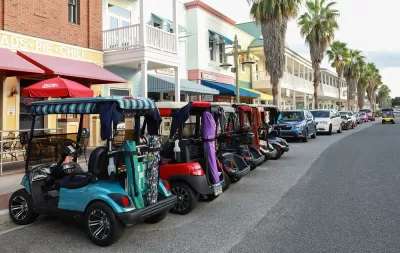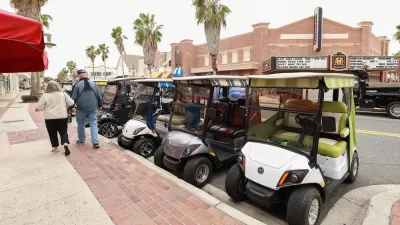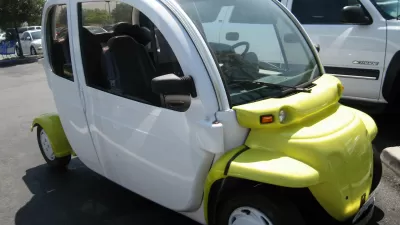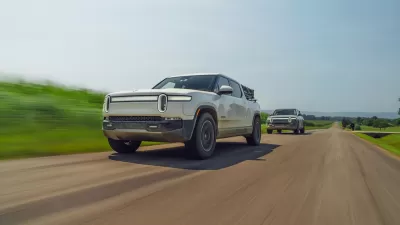More communities are catching on to the benefits of golf carts as a safe, low-emissions mode of transport for neighborhood trips.

In a piece extolling the virtues of golf carts, David Zipper argues that the diminutive vehicle could play a “starring role” in “the next chapter of urban mobility.”
According to a 2015 Harvard study, a “souped up golf cart” offered the most transformative option for future transportation. “Indeed, these puttering vehicles, most often associated with leisure and affluence, just might provide a pathway toward safe, affordable, and entertaining rides for the masses.”
Zipper outlines the benefits of golf carts: “Carts can be either gas-powered or electric, typically costing around $10,000, give or take a few thousand. They generally weigh 500 to 1,100 pounds and travel under 20 mph, making them significantly lighter and slower than a car. A roof provides protection from the sun; an optional plastic enclosure can keep users dry when it rains.”
As an example, Peachtree City outside Atlanta features 100 miles of paths designed for golf carts, pedestrians, and people on bikes or scooters that connect the community’s various destinations and have prompted many residents to replace short car trips with cart rides. Last year, Alissa Walker highlighted the benefits of golf carts in Florida’s The Villages, a 55-plus community whore residents rely on golf carts for many daily errands.
According to Peachtree City Mayor Kim Learnard, “[Golf carts] provide accessibility for residents who aren’t able to drive; they enable local shops to expand parking capacity (golf cart spots are significantly smaller than those for cars); the electric models are quiet and don’t pollute.” Learnard even believes golf carts lead to more social interactions between neighbors.
Zipper acknowledges the drawbacks of golf carts, such as their vulnerability to extreme weather conditions. “But golf carts could be a promising form factor for many places that lack the density to support high-frequency transit service.” As more people work from home, Zipper contends that golf carts and other types of micromobility devices can become a useful transportation mode for short neighborhood trips.
FULL STORY: Why golf carts—golf carts!—are a transportation mode of the future.

Alabama: Trump Terminates Settlements for Black Communities Harmed By Raw Sewage
Trump deemed the landmark civil rights agreement “illegal DEI and environmental justice policy.”

Planetizen Federal Action Tracker
A weekly monitor of how Trump’s orders and actions are impacting planners and planning in America.

The 120 Year Old Tiny Home Villages That Sheltered San Francisco’s Earthquake Refugees
More than a century ago, San Francisco mobilized to house thousands of residents displaced by the 1906 earthquake. Could their strategy offer a model for the present?

Ken Jennings Launches Transit Web Series
The Jeopardy champ wants you to ride public transit.

BLM To Rescind Public Lands Rule
The change will downgrade conservation, once again putting federal land at risk for mining and other extractive uses.

Indy Neighborhood Group Builds Temporary Multi-Use Path
Community members, aided in part by funding from the city, repurposed a vehicle lane to create a protected bike and pedestrian path for the summer season.
Urban Design for Planners 1: Software Tools
This six-course series explores essential urban design concepts using open source software and equips planners with the tools they need to participate fully in the urban design process.
Planning for Universal Design
Learn the tools for implementing Universal Design in planning regulations.
Clanton & Associates, Inc.
Jessamine County Fiscal Court
Institute for Housing and Urban Development Studies (IHS)
City of Grandview
Harvard GSD Executive Education
Toledo-Lucas County Plan Commissions
Salt Lake City
NYU Wagner Graduate School of Public Service





























